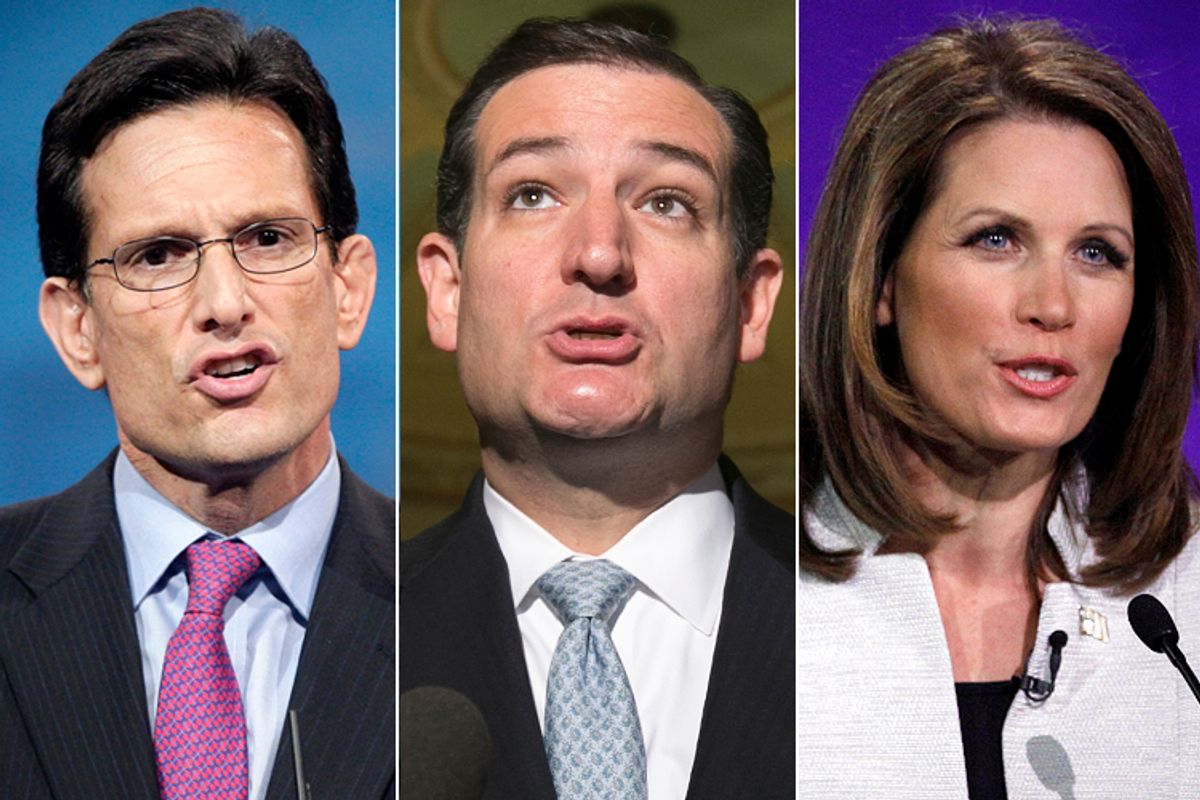Poking through a new reformist conservative manifesto called “Room to Grow,” that was released by YG Network (YG stands for “Young Guns”), a few things immediately stand out. The first is that of the thirteen essays that comprise the document, twelve are written by men. Also, this path forward for a new conservative economic agenda doesn’t say a word about immigration. But the lack of female input and immigration prescriptions aside, the document certainly doesn’t lack for ambition.
The authors of the manifesto see a Republican Party that has grown too narrow in its vision and too beholden to the Reagan mythology. “Conservatives need to set aside their habit of speaking as if the very same solutions we offered a generation ago would work equally well today,” Peter Wehner writes in the introduction. “The truth is that many conservative polices worked in the 1980s – but conditions have changed, often dramatically, and conservatives haven’t changed sufficiently with them.”
Statements like this and documents like “Room to Grow” are a strong indicator of just how traumatic the 2012 election was for the Republican Party. YG Network’s document can be seen as a sort of companion piece to the Republican National Committee’s “Growth & Opportunity Project,” which laid out recommendations for how the party can improve its image among emerging key voter demographics. There’s a sect of Republicans who are desperate to distance themselves from the brand of politics that resulted in Mitt Romney’s defeat, having realized that their long-term outlook is bleak.
The thing that’s keeping them from reforming Republican Party, however, is the Republican Party.
The Growth & Opportunity Project has largely been shunted to the wayside as Republicans have decided that it’s easier to redouble their efforts to agitate elderly white voters and trust that the Democratic base won’t turn out for 2014. That document’s recommendation that the Republican Party embrace comprehensive immigration reform has been glaringly ignored (the absence of immigration policy in “Room to Grow” reinforces this point).
“Room to Grow” makes similar challenges to the Republican orthodoxy, and there’s little reason to think the party will be open to altering its approach to policymaking.
The friction comes from the reformists’ call to refocus the GOP attention from the wealthy to the middle class. Standing in their way is over a generation’s worth of Republican thought and policy that has been geared specifically and unerringly at conferring advantages to the wealthy while stripping the poor and less fortunate of government benefits.
To give a sense of just how ingrained this thinking has become, the Pew Research Center conducted a survey this past January that asked respondents what they thought would be the most effective way to combat poverty. A full 70 percent of self-identified conservative Republicans felt that “lowering taxes on the wealthy and corporations to encourage investment and economic growth” was the best way to help the poor and reduce inequality.
Jonathan Chait notes that Ramesh Ponnuru, one of the higher-profile conservative thinkers attached to the project, argues for expanding the Earned Income Tax Credit as a way for the GOP to show that it truly cares for the poor. The problem, Chait observes, is that Republicans are right now trying to slash the EITC. President Obama and the Democrats are actually in favor of expanding the EITC, but absent Republican support in Congress, it’s not going to happen. That gets to another hurdle facing the reform movement: the GOP’s tea party-induced shift to the right has left it in a place where compromise with Democrats is viewed as heretical. Any policy idea embraced by the president or Harry Reid will be toxic to Republican legislators worried about being labeled a RINO by a primary challenger.
The document actually seems determined not to recognize the political intractability of the Republican Party. It recommends that conservatives pursue the repeal of the Affordable Care Act and replace it with a plan that borrows from a healthcare bill proposed by Tom Coburn, Orrin Hatch, and Richard Burr (which puts a greater share of health costs on the consumer). To date, Republicans have been unwilling and unable to arrive on a consensus replacement for the ACA, mainly because when they settle on an alternative they’ll have to also explain how they’ll avoid the inevitable massive disruptions to the health insurance market. “Room to Grow” breezes right past this huge political hurdle. “Proponents of the Obamacare alternative should not be deterred,” writes American Enterprise Institute fellow James Capretta, “They should be politically prudent of course, to minimize the risks.”
Therein lies the problem with the reformist drive. Smart policy is a secondary consideration for a party that yearns for debt-limit fights and government shutdowns and Benghazi select committees and draconian Paul Ryan budgets. “Prudence” has been successfully obliterated from the Republican DNA.



Shares